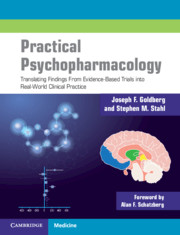‘Psychopharmacology textbooks are typically either scholarly, endlessly long and inaccessible to clinicians, or clinician-friendly but with inadequate documentation for readers who want more detailed information. Somehow, Goldberg and Stahl’s Practical Psychopharmacology combines the best of these two styles. It is astonishingly comprehensive with many Tables citing every relevant study while simultaneously providing the deep practical wisdom and experience of the two authors, both of whom are world class clinician-scholars. Practical Psychopharmacology also provides a sophisticated yet accessible review of the biological underpinnings of both psychopathology and medication effects. It does not just inform; it teaches the reader how to think about medications. This book will set the standard in our field for the foreseeable future.’
Michael Gitlin - Distinguished Professor of Clinical Psychiatry, Director, Adult Division of Psychiatry, Director, Mood Disorders Clinic, Geffen School of Medicine at UCLA
‘The translation of clinical research findings into practice is fraught. The methodology of many trials is imperfect, complex, and opaque and hard to generalise to real world patients. Many critical questions are poorly answered by the extant evidence. The basic neuroscience is extraordinarily complex. This book is a Rosetta stone for translating this evidence into practice in providing a critical bridge for practising clinicians in distilling and interpreting the evidence into clear and coherent pragmatic management and prescribing recommendations. Written by two of the world’s premier authorities, it is infused with a rare synergy of clinical wisdom and neuroscience expertise and is an essential resource for any practising prescriber of psychotropic agents.’
Michael Berk - NHMRC Senior Principal Research Fellow; Alfred Deakin Professor of Psychiatry, School of Medicine, Deakin University and Barwon Health; Director, IMPACT, the Institute for Mental and Physical Health and Clinical Translation
‘Drs. Goldberg and Stahl have reminded us that they are scientific artisans by creating a pragmatic, patient-centered set of guiding principles in clinical psychopharmacology. The emergence of newer psychopharmacologic treatments and expansion of indications for previously available agents has provided hope for identifying therapeutic avenues for patients to improve their general wellbeing, but also can feel daunting, overwhelming, and a source of entropy. Consequently, it is not uncommon for clinicians at point of care to be genuinely perplexed as to which treatments and capabilities are ‘promising rather than prime-time’. The authors have deftly synthesized the scientific literature and have produced a book that is comprehensive, concise, and an invaluable source of decision support at the point of care for multidisciplinary practitioners who provide care to persons with mental disorders.’
Roger S. McIntyre - Professor of Psychiatry and Pharmacology and Head, Mood Disorders Psychopharmacology Unit, University of Toronto, Canada



